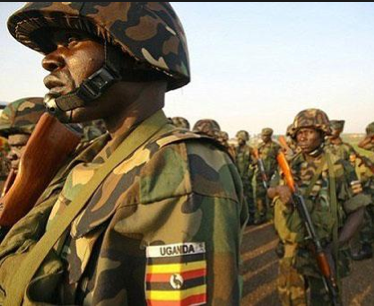Ugandan lawmaker describes UPDF mission in South Sudan as illegal
April 9, 2015 (KAMPALA) – An opposition leading member of national legislature on Thursday said the mission of Ugandan troops, involved in the inter South Sudanese conflict, was risky and illegal and urged to withdraw it from the war-ravaged country.

Ken-Lukyamuzi questioned the circumstances that led to the mission in the first place, saying Ugandan president Yoweri Museveni had not clarified the situation to the parliament.
“Whatever President Museveni’s government says, the continued stay of Ugandan troops in South Sudan grossly violates international law and must be urgently reviewed,” he wrote in an opinion article published in the Ugandan Observer.
“The question people continue to ask is why Uganda rushed in just after the spark of the war,” he said.
The lawmaker further said there was no evidence indicating the official invitation of UPDF by South Sudan president Salva Kiir, saying president Museveni failed to provide the invitation letter to parliament when inquired to produce it.
However, Uganda government on many occasions alleged that its troops were invited by president Salva Kiir.
The lawmaker however said it was time the troops withdrew and return home after 14 months of interfering in the unending internal civil war in the neighbouring country.
There have been conflicting reasons for the UPDF deployment in South Sudan, one of which was to hunt for the rebel group of the Lord’s Resistance Army (LRA) in western part of the country.
But when the war broke out on 15 December 2013 in the capital, Juba, UPDF immediately deployed to the war zone far from the threat of the LRA with the pretext that it was evacuating its citizens to safety.
Thousands of more UPDF troops were then deployed and involved in active combat against the rebel forces led by the former vice-president, Riek Machar.
UPDF successfully stopped speedy advance of rebel fighters who were matching towards Juba after they took control of the strategic Jonglei state’s capital, Bor.
UPDF retook the state capital, boasting about it, and has since continued to fight in other northern states of Upper Nile by carrying out bombings against the rebel-held territories.
However, president Museveni said his troops would remain in the country to provide security for the capital, Juba, where president Kiir’s government sits, claiming that the capital would be overrun by the rebels should they leave it to South Sudan army to protect.
UPDF also provides security for Bor and its surroundings, making sure the rebels would not recapture the state capital and threaten Juba.
Late last year, the two allied countries further their security cooperation by signing a military cooperation agreement which authorised Kampala to purchase weaponry on behalf of Juba and to continue with direct combat support against the rebels.
South Sudanese rebels have however been calling for the withdrawal of the foreign forces from South Sudan.
The rebels said the presence of the Ugandan forces and other allied foreign rebel groups was undermining the peace process.
The Intergovernmental Authority on Development (IGAD) which has been mediating the peace process in vain for the past 14 months also failed to persuade their member state, Uganda, to withdraw its forces in implementation of the ceasefire agreement the regional bloc brokered.
But the Ugandan opposition leader said there were signs that the war may continue in South Sudan and that UPDF should not continue to take security responsibility in South Sudan for indefinite period of time.
“There is a problem in South Sudan. It appears that both sides in the South Sudan civil war are planning for the conflict to continue. The agreements signed on the cessation of hostilities in Addis Ababa have not reached any meaningful end,” he said.
(ST)
